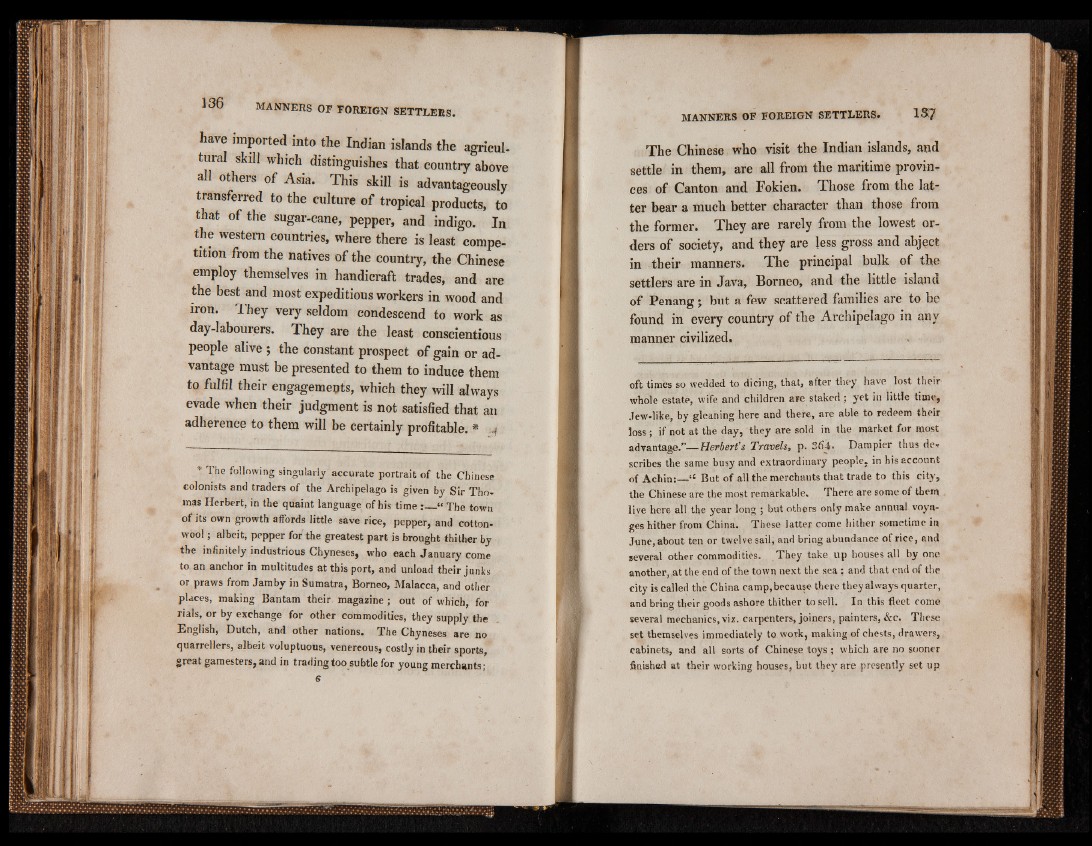
have imported into the Indian islands the agricultural
skill which distinguishes that country above
all others of Asia. This skill is advantageously
transferred to the culture of tropical products, to
that of the sugar-cane, pepper, and indigo. In
the western countries, where there is least competition
from the natives of the country, the Chinese
employ themselves in handicraft trades, and are
the best and most expeditions workers in wood and
iron. They very seldom condescend to work as
day-labourers. They are the least conscientious
people alive ; the constant prospect of gain or advantage
must be presented to them to induce them
to fulfil their engagements, which they will always
evade when their judgment is not satisfied that an
adherence to them will be certainly profitable. * g
* The following singularly accurate portrait of the Chinese
colonists and traders of the Archipelago is given by Sir Thomas
Herbert, in the quaint language of his time : “ The town
of its own growth affords little save rice, pepper, and cottonwool
; albeit, pepper for the greatest part is brought thither by
the infinitely industrious Chyneses, who each January come
to an anchor in multitudes at this port, and unload their junks
or praws from Jamby in Sumatra, Borneo, Malacca, and other
places, making Bantam their magazine; out of which, for
rials, or by exchange for other commodities, they supply the
English, Dutch, and other nations. The Chyneses are no
quarrellers, albeit voluptuous, venereous, costly in their sports,
great gamesters, and in trading too subtle for young merchants;
The Chinese who visit the Indian islands, and
settle in them, are all from the maritime provinces
of Canton and Fokien. Those from the lat"
ter bear a much better character than those from
the former. They are rarely from the lowest orders
of society, and they are less gross and abject
in their manners. The principal bulk of the
settlers are in Java, Borneo, and the little island
of Penang; but a few scattered families are to be
found in every country of the Archipelago in any
manner civilized.
oft times so wedded to dicing, that, after they have lost their
whole estate, wife and children are staked ; yet in little time,
Jew-like, by gleaning here and there, are able to redeem their
loss; if not at the day, they are sold in the market for most
ad vantage.”— Herbert's Travels, p. 364,. Dampier thus describes
the same busy and extraordinary people, in his account
of Achin:—“ But of all the merchants that trade to this city,
the Chinese are the most remarkable. There are some of them
live here all the year long ; but others only make annual voyages
hither from China. These latter come hither sometime in
June, about ten or twelve sail, and bring abundance of rice, and
several other commodities. They take up houses all by one
another, at the end of the town next the sea : and that end of the
city is called the China camp,because there they always quarter,
and bring their goods ashore thither to sell. In this fleet come
several mechanics, viz. carpenters, joiners, painters, &c. These
set themselves immediately to work, making of chests, drawers,
cabinets, and all sorts of Chinese to y s; which are no sooner
finished at their working houses, but they are presently set up